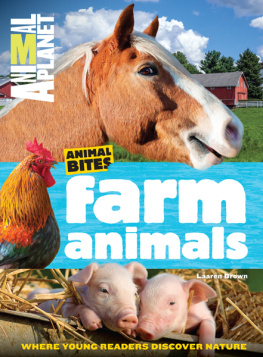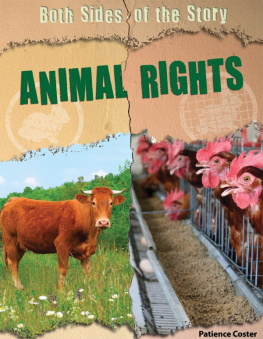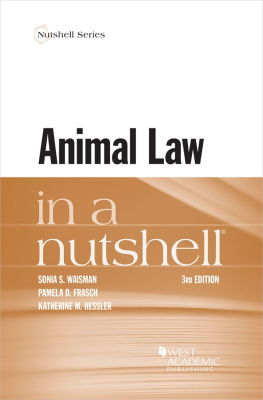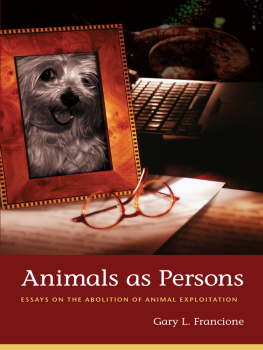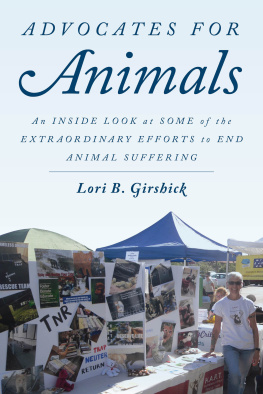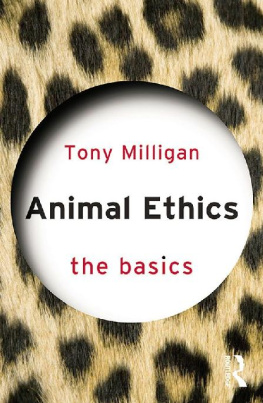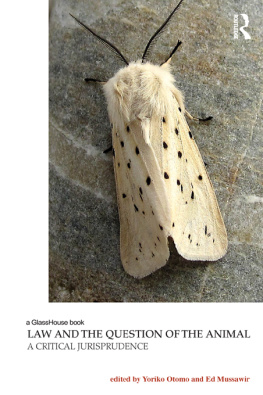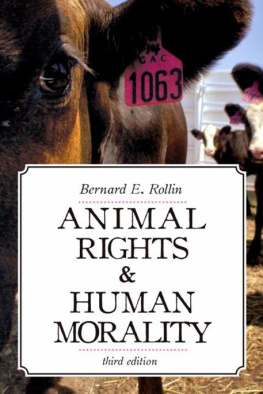ANIMAL RIGHTS
WHAT EVERYONE NEEDS TO KNOW
ANIMAL RIGHTS
WHAT EVERYONE NEEDS TO KNOW
PAUL WALDAU


Oxford University Press, Inc., publishes works that further
Oxford Universitys objective of excellence
in research, scholarship, and education.
Oxford New York
Auckland Cape Town Dar es Salaam Hong Kong Karachi
Kuala Lumpur Madrid Melbourne Mexico City Nairobi
New Delhi Shanghai Taipei Toronto
With offices in
Argentina Austria Brazil Chile Czech Republic France Greece
Guatemala Hungary Italy Japan Poland Portugal Singapore
South Korea Switzerland Thailand Turkey Ukraine Vietnam
Copyright 2011 by Oxford University Press, Inc.
Published by Oxford University Press, Inc.
198 Madison Avenue, New York, NY 10016
www.oup.com
Oxford is a registered trademark of Oxford University Press
All rights reserved. No part of this publication may be reproduced, stored in a retrieval system, or transmitted, in any form or by any means, electronic, mechanical, photocopying, recording, or otherwise, without the prior permission of Oxford University Press.
Library of Congress Cataloging-in-Publication Data
Waldau, Paul.
Animal rights: what everyone needs to know / Paul Waldau.
p. cm.
Includes index.
ISBN 978-0-19-973997-4; 978-0-19-973996-7 (pbk.)
1. Animal rights.
I. Title.
HV4708.W35 2010
179.3dc22 2010011035
1 3 5 7 9 8 6 4 2
Printed in the United States of America
on acid-free paper
CONTENTS
10 Major Figures and Organizations in the
Animal Rights Movement
PREFACE
As I contemplated how to answer the question What do people need to know? about the important but controversial notion of animal rights, I considered three things. First, I thought of the hundreds, perhaps thousands, of conversations on this topic that I have had with people in ordinary walks of life from all over the world. These have helped me appreciate the great variety of views on this topic.
Second, I thought about what I had learned during several decades of studying animal topics in various educational contexts. I spent years in Oxford, England, studying the academic side of various issues, and I then spent a decade teaching in a veterinary school. At about the same time, I taught the subject of animal law at some of my countrys best law schools. I also had the privilege of lecturing at dozens of universities and law schools as well as in public conferences, before thousands of people.
Third, I looked at hundreds of books, printed articles and Web sites that used the phrase animal rights because I wanted to see whether people were talking toor pastone another.
Based on all of this background and research, I came to the conclusion that the following issues are the most important ones, and thus what everyone needs to know, about animal rights.
Animal rights is an ancient topic that recently has taken a special twist. The phrase animal rights has been, and still is, employed most often to describe moral rights and social values in favor of compassion and against cruelty. The modern twist is the emergence of conversations where the term means all of this and more, namely, the possibility of legal rights for some or all nonhuman animals. The latter are important protections, and today there is a very active debate over how often and to what extent our different human societies might put specific legal rights and other protections into place for specific animals.
This debate about animal rights as specific legal rights colors what many influential people say about the term, but this special and, I think, important sense of the term still remains secondary to the more generic meaning of moral protections. This book tries to explain why animal rights in the sense of moral rights is the larger and more fundamental issue, and why specific legal rights for specific nonhuman individuals reflects, but does not encompass all of, animal rights as moral rights.
Second, the debate over animal rights often is polarized, but only in some circles. In those places where polarization impacts how people talk and hear one another as this issue is discussed, the advocates and activists at opposite ends of the long continuum of views continue to debate in ways that fuel even further polarization.
Third and most relevant to todays use of animal rights, I found that many people do connect with each other when talking about animal rights. Further, many people recognize discussions about animal rights as pro-people. This conclusion will seem counterintuitive to some, perhaps even an outright falsehood to others. But if you explore the debates over animal rights at length, you will notice that those who make the claim that animal rights can be pro-people argue their point in several different ways. Some argue this must be so because humans are animals. Others argue that talk of animal rights affirms life, which of course has decidedly pro-human features. Still others argue that concerns to protect the living beings outside our own species honor humans in a special way by, first, affirming and, second, strengthening our ethical nature.
Lots of people also sense that the phrase animal rights is not a complicated phrase, but instead a phrase that easily and naturally means something very simple and basic along the lines of protections for other living beings. Others think the phrase most truly means we should listen to the voice of animals. Veterinary students often told me that animal rights is a valuable term, but when they use it they risk condemnation by some classmates and, tragically, members of their veterinary school faculty and administration.
Many people feel animal rights has undeniable appeal but that it is compromised whenever animal activists use violence on behalf of the cause. Quite a few who mentioned violence commented on how rare such violence was, and then answered their own concerns by asking out loud, Why let a few violent people control whether we use a term that describes a movement that was originally nonviolent and today remains overwhelmingly so?
Today, as this book shows, animal protection is a worldwide social movement. At times, active citizens in this movement challenge deeply cherished values and long-standing practices. Some other citizens react strongly to such challenges, which suggests that the risk of polarization is not going to disappear, no matter how effective this book or any other single volume is at getting all of us to talk fairly, fully, and respectfully about the basic issue of our relationships with the life out beyond the species line.
What is most sorely needed is a willingness to recognize that the debate over animal rights is one in which fundamental values are being worked out. Without question, some people feel strongly that mere mention of the topic is a repudiation of humans and thus deeply immoral. But I found that many more people feel this kind of thinking focused solely on humans falls short of humans ethical possibilities.
Thus I think people need to know how many people find multiple connections with the world in concerns for animal rights. Because the phrase works for so many not as a repudiation of humans but as an affirmation of humans special abilities to care about others, whether those others be human or other-than-human, the phrase opens doors to the rich, more-than-human world that is out beyond our species. For them, animal rights is a win-win situation, not an either/or matter.
Next page




